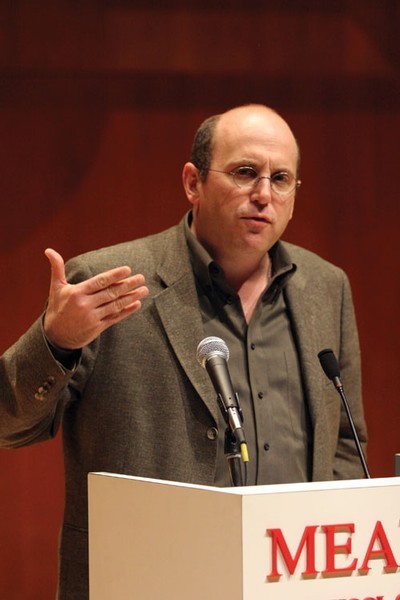
Eichenwald lectures on journalism (Photo by John Schreiber, The Daily Campus)
At the 2005 Rosine Smith Sammons Lecture in Media Ethics, Kurt Eichenwald, writer and investigative reporter for The New York Times, spoke about the responsibilities of journalists to seek accurate answers in the search for the truth.
“We should never delude ourselves into believing what we find is true,” said Eichenwald, adding that what one reads or finds isn’t always the complete truth.
We have a reason to be sad because of journalists like Jayson Blair, Jack Kelley and Stephen Glass, who were unable to uphold a code of ethics in their reporting, Eichenwald said.
Instead, these journalists chose to fabricate “sexy” stories with false facts, fictional datelines and plagiarized material. According to Eichenwald, their arrogance and cowardliness ultimately led to their destruction.
Eichenwald also discussed the Enron accounting scandal and how he factually reported the topic for his 2005 bestselling book, “Conspiracy of Fools.”
“I’m really interested in finding out what he has to say about Enron and how it has effected employee loyalty and future corporations,” junior Tom Rodgers said.
In a student question and answer session Wednesday afternoon, Eichenwald outlined the reporting and interviewing techniques he used to research information for his book “Conspiracy of Fools.”
Eichenwald said he first gathered all the “scraps of paper” on the topic and organized them chronologically and by theme. Next, he interviewed everyone related to the topic extensively, compared the interviews and then interviewed again to fill any holes.
“He made a great point to first soften up interviewees by talking about their background for a couple hours before jumping into a serious topic. I was definitely impressed with his passion about what he believes is wrong with journalism today,” junior Sam Merten said.
Eichenwald said he is not afraid to admit when he does not know the answer to a question. He strongly believes that if journalists don’t ask questions when they don’t know, and if they don’t check facts, they will ultimately destroy the journalism profession.
“It’s lazy. It’s wrong. It’s not what we’ve been put on earth to do. If you don’t want to do the work then don’t get into the profession,” Eichenwald said.
Eichenwald also proposed a solution to what he denounced as the low standards of modern journalism. According to Eichenwald, journalists lead society astray by catering to the opinions of certain groups and writing in an overly simplistic way.
Eichenwald’s solution is narrative journalism, a dialogue-intensive style he says increases readership and intellectual interest through a combination of entertainment and fact.
“People like storytelling,” he said. “We are in the entertainment business. There is no reason when we write something it has to be boring.”
Melissa Henry, a junior journalism major attending the session, found the theory interesting.
“It’s obviously inventive that he decided to tell the closest thing to the truth in that way,” she said.
Eichenwald acknowledged the lack of acceptance narrative journalism receives from the news world.
“It’s a form of writing denigrated by others, but it’s hard,” he said, adding that he feels the technique is 90 percent more accurate than other forms of reporting because of its rigorous interviewing process.
During the session, Eichenwald also addressed his coverage of the accounting scandal that led to the fall of Enron, a topic that he addressed later in his later speech.
“It became the most epic . . . intellectually challenging work I’ve ever done,” he said.
Eichenwald said narrative journalism allowed him to report such a detailed and factual recreation of the events.
“There were no liberties taken,” he said. “[By] forcing people to recollect things, you get an amazing amount of agreement.”
Sophomore journalism major Kristen Maynard was primarily interested in Eichenwald’s recollection of the Enron events.
“I know the Skillings, who were involved in the scandal,” she said. “I’d like to know his [Eichenwald’s] side of the story.”
Even with narrative journalism, Eichenwald said, the actual truth is too complex to represent beyond a close rendition based on fact.
“Don’t think you’re in the business for the truth. You’re not,” he said.









